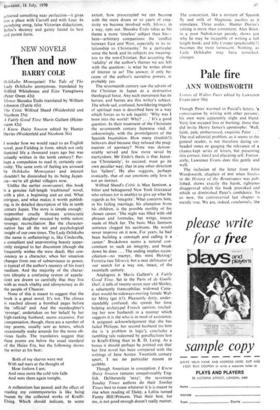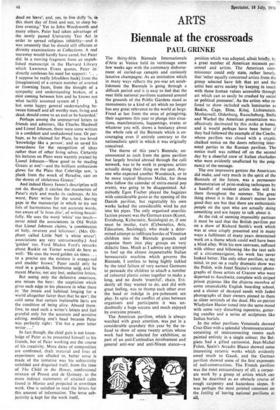Pale fire
ANN WORDSWORTH
Letters of Walter Pater edited by Lawrence Evans (ouP 50s)
Though Pater warmed to Pascal's letters, 'a conversation by writing with other persons. his own were apparently slight and bland. Very few escaped loss or burning; those that did invite Henry James's apostrophe: 'Well, faint, pale, embarrassed, exquisite Pater . . The real editorial problem, as it seems to the general reader, is not therefore dating tin- headed notes or gauging the relevance of a chance-kept series of letters, but presenting this correct, timid and placating self. Fortun- ately, Lawrence Evans does this gently and well.
The inclusion of the letter from John Wordsworth, chaplain of BNC when Studies in the History of the Renaissance was pub- lished, shows exactly the harsh, righteous disapproval which the book provoked and which so diminished Pater's confidence. To us now, the controversial last chapter is merely true. We are, indeed, condanmes, 'the
dead on leave', and, yes, to live dully 'is, in this short day of frost and sun, to sleep be- fore evening' Yet to John Wordsworth and many others, Pater had taken advantage of the newly passed University Test Act in order to spread religious infidelity—and it was unseemly that he should still officiate at divinity examinations at Collections. A real tearaway would hardly have cared, but Pater did. In a moving fragment from an unpub- lished manuscript in the Harvard Library which Lawrence Evans quotes, Pater in directly confesses his need for support: . I suppose he really [shudders back] from the [imagination] of a certain number of averted or frowning faces, from the thought of a sympathy and understanding broken, of a mist coming between him and he knows not what tacitly assumed system of [ ], lest some happy general understanding be- tween himself and all worthy men, living and dead, should come to an end or be hazarded.'
Perhaps among the unpreserved letters to friends and admirers, like Charles Shadwell and Lionel Johnson, there were some written in a confident and unshadowed tone. Or per- haps, as he claimed for Plato, he too loved 'knowledge like a person', and so saved his inwardness for the recognition of ideas rather than of other living selves. Certainly his lectures on Plato were warmly praised by Lionel Johnson—`How good to be reading Greats at mc'—and the brilliant enthusiasm glows for the Plato that Coleridge saw, 'a plank from the wreck of Paradise, cast on the shores of idolatrous Greece' And indeed Henry James's description will not do, though it catches the mannerism of Pater's style and mocks its cadences. At his worst, Pater writes for the sound, leaving gaps in the manuscript in which to try out lists of harmonious but not accurate words, too aware of le beau dire', of writing beauti- fully. He uses the word 'white' too much— never mind the associations in Old Welsh that Lionel Johnson claims, 'a combination of holy, reverent and felicitous'. (Mrs Oli- phant called Little Nell 'a white smear'; associations are very untrustworthy.) And 'golden' too. Ford Madox Ford's remarks about Ruskin on Turner would do here as well: 'He uses the word golden six times ... to a precise eye the mixture is orange-red and madder brown.' Pater could only be read in a gondola, Swinburne said, and he meant Marius, not any lost, seductive letters.
But seeing only the defensive sweetness, one misses the best: the scepticism which gives such edge to his pleasure in what there is; 'the innate and habitual longing for a world altogether fairer than that he saw'; the cold sense that certain inalienable facts are the condition of being alive. Absurd there- fore, to read such a writer's letters and feel grateful only for the accurate and sensitive editing, nodding one's head because Pater was perfectly right: 'I'm but a poor letter writer
In fact though, the chief gain is not know- ledge of Pater as he presented himself to his friends, but of Pater working out the course of his creativity. More dates of composition are confirmed, draft material and lines of experiment are alluded to, better sense is made of the tentative way his subjectivity unfolded and disguised itself, from the time of The Child in the House, confessional mixture of Proust and de Quincey, to the more indirect statements of attained calm found in Marius and projected in unwritten work. One is satisfied to read the letters for this amount of information. The tense sub- jectivity is kept for the work itself,























































 Previous page
Previous page